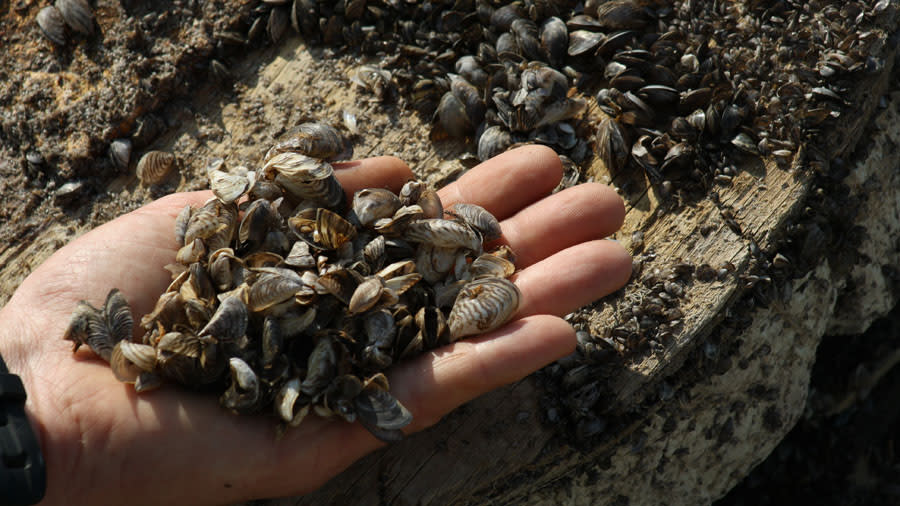‘Devastating’: Invasive species larva found in Colorado River, Government Highline Canal

DENVER (KDVR) — A European species of mussels has spread into the Colorado River and the Government Highline Canal near Grand Junction, threatening the livelihoods and pastimes of all water users in those regions.
Zebra mussels have been a target of the Colorado Parks and Wildlife for a while, aiming to prevent the spread of non-native mussels after they spread into Colorado waters, likely due to some hitching rides on boats, trailers or other equipment that makes contact with bodies of water.
Denny’s in Lakewood evacuated due to fire
“This challenging discovery has ecological and economic impacts not only on the Grand Valley but potential statewide impacts as well,” said CPW Director Jeff Davis in the announcement. “CPW is committed to working with all of our partners as we work to better understand the extent of this discovery and the next steps in protecting the natural resources and infrastructure.”
The discovery of zebra mussel veligers in the Government Highline Canal was made on July 1 during routine testing, according to Colorado Parks and Wildlife. Wildlife workers then sent a plankton sample from the canal to the Aquatic Nuisance Species Lab in Denver.
Lab workers identified a single suspected veliger, or larva, in the sample, which was sent to CPW’s Aquatic Animal Health Lab for more analysis. On July 9, the lab told Robert Walters, Invasive Species Program Manager, that the sample was positive for zebra mussel DNA.
“This news is devastating,” said Tina Bergonzini, Grand Valley Water Users Association General Manager, in a release. “Having our canal and the Colorado River test positive increases the threat of this invasive species and could impact everyone in the Grand Valley. From irrigation to drinking water, the ramifications cannot be underestimated or overstated. Our efforts, alongside our partners at CPW and the (Bureau of Reclamation), will be increased to protect our infrastructure, the livelihoods of so many, and water security for us all.”
Statewide ecologic and infrastructure impacts anticipated
The mussels can cause a range of ecological impacts to Colorado, according to Colorado Parks and Wildlife. Zebra mussels in the Colorado River could negatively impact the native fish populations due to their filter-feeding strategies to strip their prey from the water.
Female zebra mussels can also produce up to a million eggs each spawning season, and the mussels bond to surfaces while maturing. This makes the mussels hard to remove and can lead to clogged water infrastructure — ensuring long-term maintenance issues, according to CPW.
Colorado experiencing emergency blood shortage, how you can donate
Slower-moving waters are more prone to this invasive species, CPW said. The species could be especially harmful to infrastructure using Colorado River water.
“We are disappointed in the situation we find ourselves in,” said Ed Warner, Area Manager, Bureau of Reclamation Western Colorado Area Office, in a release. “We know how much effort CPW has put into keeping the Colorado River clear of zebra mussels. This is an extremely difficult scenario for all who rely on the Upper Colorado River system. We look forward to partnering with CPW, our stakeholders, and all involved to do what we can to address the situation.”
CPW staff is working with the Bureau of Reclamation and the Grand Valley Water Users Association in the next steps. Signs alerting members of the public to the river’s new status of “suspect” have been posted at river access points, beginning at the De Beque Canyon and ending at the Loma Boat Ramp.
How you can help prevent the spread of invasive mussels
CPW “strongly” encourages anyone entering the Colorado River to boat, float, paddle or fish to clean, drain and dry any equipment or vessels used, including paddle boards, kayaks and fishing gear, upon exiting the river.
Rise in OB patients with strep A sepsis a mystery to doctors
“Detecting mussels in the Colorado River highlights how critical it is for boaters, paddlers, anglers, and any person recreating in Colorado’s waters to do their part in preventing the spread,” said Robert Walters, CPW’s Invasive Species program manager.
Boaters must ensure their craft is registered and purchase an aquatic nuisance species stamp to launch in CPW-controlled sites.
CPW is looking at its options for the management of Highline Lake because of this new information, where zebra mussels have already made themselves at home. Eradicating mussels is “extremely difficult,” according to Walters, who said in March that the agency focuses on prevention, rather than eradication.
Updated access, fishing regulations and water management for Highline Lake will be provided after the decisions have been made.
Copyright 2024 Nexstar Media, Inc. All rights reserved. This material may not be published, broadcast, rewritten, or redistributed.
For the latest news, weather, sports, and streaming video, head to FOX31 Denver.

